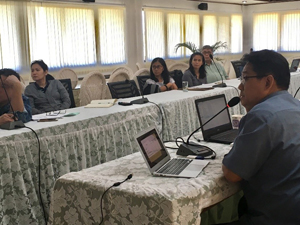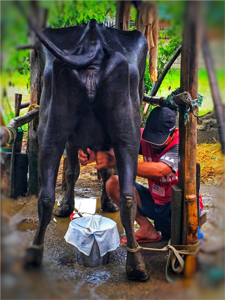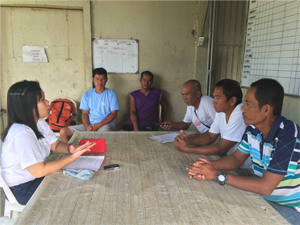 Findings of a study revealed that cooperative plays an important role in stimulating adoption of technology and improving production and marketing efficiencies of coffee and dairy buffalo by linking farmers to markets, providing inputs, and assisting in the development of farmers’ skills.
Findings of a study revealed that cooperative plays an important role in stimulating adoption of technology and improving production and marketing efficiencies of coffee and dairy buffalo by linking farmers to markets, providing inputs, and assisting in the development of farmers’ skills.
The study, “Role of Cooperatives in Technology Adoption for Improved Production and Market Efficiency in Coffee and Dairy Buffalo” is funded by the Philippine Council for Agriculture, Aquatic and Natural Resources Research and Development of the Department of Science and Technology (DOST-PCAARRD).
During the terminal review of the study, Dr. Agham Cuevas and Prof. Liezel Cruz of the University of the Philippines Los Baños (UPLB), emphasized that there is a positive relationship between cooperative membership and technology adoption in coffee and dairy buffalo production. This implies that cooperative members are likely to adopt more bundles of technology than non-members.
 Dr. Cuevas served as the program leader and project leader for the dairy buffalo component, while Prof. Cruz was the project leader for the coffee component. The review was held on January 7, 2019 at the PCAARRD headquarters.
Dr. Cuevas served as the program leader and project leader for the dairy buffalo component, while Prof. Cruz was the project leader for the coffee component. The review was held on January 7, 2019 at the PCAARRD headquarters.
Based on the results, an average dairy buffalo farmer would adopt more milk production and marketing technologies if he/she is a cooperative member. On the other hand, an average coffee farmer, who is a cooperative member, would adopt more technologies in coffee production and post-harvest activities than if he/she is a non-member.
It was also found that cooperative members have better performance relative to non-members mainly due to higher technology adoption, regular attendance to trainings, and access to extension programs. In fact, dairy buffalo cooperative members generate higher total and net returns, which can also be attributed to the low cost incurred in the production.
The study also suggests that policy makers should continue policy incentives to support smallholder farmers to join coffee organizations. On the other hand, cooperatives should also offer credit services to encourage technology adoption among members.
Meanwhile, to improve the study, the evaluators recommended to elaborate the discussion on the factors affecting technology adoption and the reasons for non-adoption of both cooperative members and non-members. They also suggested to consider the causes of failure of cooperatives and the various types of cooperatives in the results.
 The terminal review was conducted to track if the expected outputs of the project were achieved after a year and six months of implementation– from August 1, 2018 to January 31, 2019. Particularly, it was done to see if the empirical evidences are enough to support the claims of this study.
The terminal review was conducted to track if the expected outputs of the project were achieved after a year and six months of implementation– from August 1, 2018 to January 31, 2019. Particularly, it was done to see if the empirical evidences are enough to support the claims of this study.
The review was facilitated by the Socio-Economics Research Division (SERD) under the leadership of Dr. Ernesto Brown. The whole project team, headed by Dr. Cuevas, were also present in the review. It was joined by external evaluator Dr. Rolando Bello of UPLB, and evaluators from PCAARRD: Ms. Maria Teresa de Guzman of the Agricultural Resources Management Research Division (ARMRD) and Dr. Aleli Collado and Mr. Eric Perez of the Livestock Research Division (LRD).
